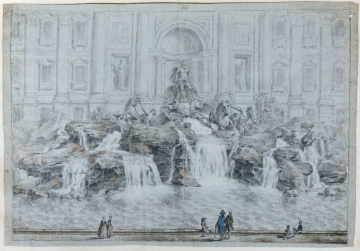Inscribed
Inscribed in ink 4; in red ink 56
Signed and dated
Medium and dimensions
Pencil, chalk, bodycolour, on grey paper418 x 606 (two joined sheets; narrow strip added to left edge)
Hand
Unidentified eighteenth-century artist
Notes
This drawing is one of three views of the Trevi Fountain, originally numbered 4, 5 and 6 (see Adam vol.56/55 and 56/57). The viewpoint here is similar to that in vol.56/55 albeit nearer, less oblique and closer to the elevation traditionally shown by Laurent Pecheux and others (see J. Pinto The Trevi Fountain, London, 1986, figs.181-3). There are also minor variations in the drawing of the sculpture in the two niches, and the foreground figures are different. There is a copy of this drawing by C J Richardson (1806-1871) in the Victoria & Albert Museum, London (P&D 93.G.8/58).The fountain, by architect Nicola Salvi (d.1751)and sculptor Giovanni Battista Maini, was inaugurated in 1744, although unfinished, and is depicted in the view by Giovanni Paolo Pannini (1695-1764) of 1744. Work was suspended during 1751 and 1758 and the fountain was only completed in 1762, after Robert Adam had left Rome (see Pinto op.cit. for a full account of the history of the fountain). It seems likely that this drawing and Adam vol.56/55 and 56/57 were acquired from the same source as Laurent Pecheux's elevation of 1753 for Sir William Chambers (Harris & Snodin Sir William Chambers, Architect to George III (New Haven and London, 1997), see Soane Museum SM 22/2/8, illus. p.22), although the draughtsmanship here is very different in its liveliness and colour, and in the greater emphasis given to the sculpture over the architecture. Like Chambers, Robert Adam appears to have admired Salvi and regarded his work among '... what good buildings are in Rome ...' (see Fleming Robert Adam and His Circle in Edinburgh & Rome (London, 1962), p.359). The three views may well have been part of Adam's plan of 1755 '... to do the fountains ...' of Rome, using '... my own and our myrmidons' (Fleming 1962, p.152). He was also interested in, and drew, the aqueduct that fed Salvi's fountain (see Clerk Collection, Scotland, Clerk 106).
Literature
Rep. J. Pinto The Trevi Fountain, London, 1986, fig.158
Level
Drawing
Exhibition history
The Adam Brothers in Rome: Drawings from the Grand Tour, Sir John Soane's Museum, London, 25 September 2008 - 14 February 2009
Digitisation of the Drawings Collection has been made possible through the generosity of the Leon Levy Foundation


